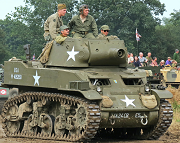|
yo tt how is it that general nivelle ever had a career outside of his role as a theoretician the man seems like a completely bloody-minded idiot as a field commander
|
|
|
|

|
| # ? May 25, 2024 01:08 |
|
He was very, very, very important in the development of the rolling barrage, which got him his corps command; then he lucked into being at Verdun, which was even more than the rest of the war about just beating the poo poo out of the other lot with artillery, and lucked into being a corps commander with a reputation when Joffre was trying to gently caress with Petain, and now suddenly he's an army commander. Then he just so happened to be coming off the back of some (extremely bloody) victories at exactly the right time: the French government was ready to throw Joffre overboard, but was absolutely not interested in hearing what Petain or Foch had to say, and wanted someone whose optimism hadn't yet opted out.
Trin Tragula fucked around with this message at 17:51 on May 21, 2016 |
|
|
|
poor pétain one can almost understand his involvement in the whole vichy farce from the perspective of wanting to avoid even more senseless death and destruction
|
|
|
|
lenoon posted:awkward men in uniform
|
|
|
|
V. Illych L. posted:poor pétain The French government was retroactively justified in overlooking such a horrible defeatist. Actually, serious question - what WAS the administration of Vichy France like and how much of an actual hand did Petain have in running it?
|
|
|
|
V. Illych L. posted:poor pétain On the one hand by the time he was brought back into government France had clearly lost the war and further resistance was pointless. On the other hand, left to his own devices in Vichy he showed himself to be a straight-up Fascist.
|
|
|
|
Tomn posted:The French government was retroactively justified in overlooking such a horrible defeatist. he was basically dictator, and ran a very tight and deeply reactionary ship. politically, he was Not a Nice Man
|
|
|
Plan Z posted:Echoing, but neat info. I gotta read up on them. Wheellocks might be the most generally decorated of all guns I've seen, probably because they were so expensive to make due to the mechanism.   (The top image is reversed to overlay it over the inside view) The simplest explanation: you have a spring-loaded wheel that a clamp holding iron pyrites is placed over, and pulling the trigger simultaneously releases the wheel to spin, opens a cover between the iron pyrites and the wheel, and lowers the pyrites onto the wheel to generate sparks. There's a ton of intricacy that goes into it because of all the problems you can face with reliability. There's a ton of small parts, but you also have to lower the iron pyrites onto an already spinning wheel because the wheel will jam if they're in contact upon release. The sear's arm that engages the middle of the wheel to lock and release it also has to lock into a carefully made depression in the wheel rather than a straight up hole, because otherwise the force on the sear would be too great for your trigger finger to release. This complexity drove the cost up, which meant that wheellocks were used alongside matchlocks instead of totally replacing them until both were mostly replaced by snapping spark-fired actions like the snaphance, flintlock, and miquelet. The upside is that the high cost of wheellocks apparently encouraged the creators and owners to have them highly decorated. Here's some examples from the Metropolitan Museum of Art I saw recently:   
|
|
|
|
|
Can someone recommend a good book (or, if I go crazy, two books) about the battle of Gettysburg? I'm going there this summer and I'm gonna be seeing some historical sites while my girlfriend attends a wedding in heat that would be way too hot to be wearing a suit and I'm secretly relieved that the invitation didn't have a +1 on it. I don't really know much at all about the ACW, and I'm not a professional historian, so I'm looking for something more geared toward the casual history fan, but basically anything I can read ahead of time that'll give me a better appreciation of the stuff I'll be seeing would be awesome. I'm asking about Gettysburg specifically, but if there's a strong go-to book about the ACW in general that would also give me a better appreciation of being there, I'm open to that too!
|
|
|
|
one can probably compare pétain to franco, in a way, but not triumphant and less cold-blooded
|
|
|
|
i mean the man was well over eighty years old at the war's onset and also a part of the old capital-E Establishment in France and grew up in the time of Napoleon III
V. Illych L. fucked around with this message at 18:06 on May 21, 2016 |
|
|
|
chitoryu12 posted:This complexity drove the cost up...
|
|
|
|
looking it up, the national humiliation of 1871 happened when he was sixteen years old. i imagine that's a harsh pill to swallow for a romantic farmer-soldier
|
|
|
|
Ainsley McTree posted:Can someone recommend a good book (or, if I go crazy, two books) about the battle of Gettysburg? I'm going there this summer and I'm gonna be seeing some historical sites while my girlfriend attends a wedding in heat that would be way too hot to be wearing a suit and I'm secretly relieved that the invitation didn't have a +1 on it. Stop by an electric map display while you're there. It seems really hokey, but they usually do an excellent job of explaining troop movements and strategy in the chronology of the battle. I don't have a specific book on it to recommend, though. Bruce Catton's series is always a good start.
|
|
|
|
chitoryu12 posted:Wheellocks might be the most generally decorated of all guns I've seen, probably because they were so expensive to make due to the mechanism. This might be more of a TFR question, but to anybody who's ever actually handled an old single-shot pistol like these - how comfortable are those grips? Old-fashioned pistols (and a lot of long arms for that matter) always look like they'd be pretty awkward to hold and fire (though I say this as someone who's never fired any kind of firearm before).
|
|
|
|
V. Illych L. posted:one can probably compare pétain to franco, in a way, but not triumphant and less cold-blooded Probably a better comparison than Fascism, yeah. Heavy on the tradition and the Catholicism, less on the modernism. Either way, just as Spain had a Not Very Nice Time after World War 2 one can assume France would have been kind of an unfun place to be if Germany had won out (and also not occupied all of France halfway through the war).
|
|
|
|
no worse than a sword grip muskets are huge and bullshit tho, don't even try without the fork unless you're huge
|
|
|
|
chitoryu12 posted:snapping spark-fired actions like the snaphance, flintlock, and miquelet You seem to know your stuff about locks. What's the difference between these locks? I see the terms used, but when I look them up I can't really tell the difference.
|
|
|
|
HEY GAL posted:hey, stonewall jackson is very well studied, He was an awkward sod, wasn't he Also Gen. Wingate
|
|
|
Grand Prize Winner posted:You seem to know your stuff about locks. What's the difference between these locks? I see the terms used, but when I look them up I can't really tell the difference. I made a big post about this, which I'll copy and edit a little here: The very first guns didn't have any form of action at all. The user simply held a length of burning something to the touch hole, detonating the gunpowder. This made it virtually impossible to aim, as you can see by the woman's awkward stance, and many early "gonnes" were mounted on tripods; handheld firearms are descended from cannons, and the first guns were literally miniaturized artillery pieces. The first "lock" (a method of automatically detonating the gunpowder with a mechanism) was the matchlock, appearing around the 1450s. This is simply a holder for the length of matchcord, placed on a spring-loaded hinge with the other end protruding out the bottom of the stock. You pull the bottom end backwards, and it levers the match down into a pan full of gunpowder. This gunpowder flares up, and the tiny explosion of flame goes through the touch hole into the gunpowder sitting at the back (the breech end) of the barrel. Most matchlocks were simply hinged levers with a spring to let the trigger and serpentine (the match holder) rotate back when you let your finger off the trigger; there were also snapping matchlocks that had the serpentine fitted with a proper sear and spring mechanism, which allowed the match to rapidly snap into the pan, but these tended to extinguish the match on impact and were mostly used as target guns. Matchlocks have many obvious drawbacks: the match has a distinctive smell and is visible glowing at night, it's useless in the rain, and the match needs to be kept lit to be reliable in battle (it's estimated that an English soldier on guard duty could burn up a mile of match in a year of just walking around with his gun at the ready). And of course, you've got flaming matchcord flopping around gunpowder. A more elegant, fireless solution was needed. Starting in 1500, that was the wheellock. This was a complex mechanism, but the basic firing principle is iron pyrites sparking on steel. The "dog" is a set of jaws holding a piece of iron pyrites, which is placed over a notched steel wheel. The wheel is wound up by inserting a square key in and turning it, and pulling the trigger simultaneously opens a cover on the pan, spins the wheel, and lowers the iron pyrites onto the wheel. This creates a shower of sparks that detonates the powder. The biggest advantage is that it removes the match from the equation, and its flaws (smell/sight, constantly consumable resource, danger around gunpowder, and lack of weatherproofing) were all gone with it. It also led directly to the first gun control laws after it was realized (and put into effect) that these guns could be kept hidden under clothing safely and quickly drawn and fired for assassination. The downside, as you can see by looking at the mechanism, is that it has watchmaker levels of complexity and was quite expensive. They were issued to the guys who worked around gunpowder and cavalry, but their expense kept the matchlock around. The wheellock did create the idea of creating sparks to detonate gunpowder, though, and this led to a new attempt to harness it around the 1550s: the snaphance. Also called various things like "snaphence" or "snaphaunce" depending on language and dialect. The snaphance has a set of jaws called a cock (since it looks kinda like a rooster's beak) that holds a piece of flint. There's a piece of steel, plus a pan cover that keeps the gunpowder in the pan clear of the rain and makes it more reliable than a matchlock in the rain (much like a wheellock). The cock is held back by a spring, with the trigger tripping a sear that releases it. The big, swinging cock scrapes the flint across the face of the steel (while a mechanism opens the pan cover), showering sparks into the pan like a wheellock. It's much less complex than a wheellock. It still wasn't perfect, though. A little cleverness let them invent the flintlock in the early 17th century. It's mostly the same as the snaphance, but simplified: the separate steel and mechanically-opened pan cover are replaced with an L-shaped piece of steel called the frizzen. The frizzen is held shut by a spring and covers the pan while also providing a piece of steel for the flint to scrape down: the flint pushes the hinged frizzen up and off the pan as it scrapes along its surface. The flintlock's simplicity and reliability immediately made it the premier firearm lock in the world, and it superseded all other locks in every country it spread to (though not every country did and it wasn't immediate; some European countries kept matchlocks until the 1720s and Tibetan nomads are still using matchlocks today for hunting and occasionally guerrilla warfare in the 20th century). You'll often hear references to a miquelet lock. This is almost identical to a flintlock and historians are still arguing today about exactly what the difference is (like whether horizontal springs count), so don't stress over it. What finally got rid of the flintlock in the late 19th century was the caplock. Experiments in chemistry during the early and mid 19th century eventually discovered that fulminate of mercury is a shock-sensitive explosive. There had been problems with flintlocks not reliably firing, and even when it went off there would be a delay of either an imperceptible fraction of a second to half a second between pulling the trigger and the gun firing. Alexander John Forsyth created a system in which tiny copper caps full of mercury fulminate would be placed over a "nipple", a hollow tube leading into the breech. The cock was replaced with a simple hammer that whacked the cap, detonating it and creating a tiny explosion that flashed through the hollow nipple into the gunpowder in the barrel. There were several major advantages to this: it 100% waterproofed the gun (there was no longer a chance of moisture getting into gunpowder in the pan, as the gunpowder was no longer there) and the percussion cap instantaneously exploded and fired the gun. Then again, you had to have the dexterity to put the tiny little cap on the nipple during the heat of battle (leading to some automatic cappers, like on the Sharps carbine used by cavalry in the Civil War; you just thumb a paper cartridge into the breech and the gun flips a cap on from an internal magazine as you pull the trigger). The caplock actually had a very short reign on the battlefield, as its invention very rapidly led to the development of reliable cartridges. Repeating and fast-loaded firearms in the mid and early 19th century often used paper cartridges, like the early Colt revolvers (Dragoon, Army, Navy, etc.) and the Sharps carbine. These were nitrated paper tubes filled with gunpowder and with a bullet glued at the end, which would be loaded into the chamber and burn up on firing. These were imperfect, often leaving soot and unburnt paper that had to be cleaned out. Before these were made, "cartridge" referred to a tube of paper with enough powder for one shot and a bullet. You would tear open one end with your teeth, pour a little powder into the priming pan, and then pour the rest of the powder down the barrel and shove the paper and bullet down after it. The paper cartridges as used in revolvers and breech-loaded rifles weren't a very good option for things like magazine loading, and they didn't really seal the breech. What was needed was a metal tube that could hold all the components. The Swiss gunsmith Jean Samuel Pauly created a variant of the paper cartridge with a copper base that was filled with potassium chlorate primer. This created a totally self-contained cartridge that would disintegrate upon firing. The concept was expanded upon until rimfire cartridges could be made. These were brass tubes filled with gunpowder, and the rim at the base is filled with priming compound. The neck is crimped around a lead bullet (this pictured cartridge is .22 Short, which dates back to 1857 with the Smith & Wesson No. 1 revolver and is still in use today). Brass is a very good cartridge material: it's an excellent heat conductor (taking a lot of the heat of firing away with it when it's removed from the gun), it expands upon firing to seal the breech and then contracts again to let it be easily extracted, and it's ductile enough to be reloaded. In rimfire guns, there's now a firing pin that the hammer hits or is attached directly to the hammer; the pin crushes the rim, creating a shock that detonates the primer. There were a few efforts to make pinfire cartridges (which incorporate the firing pin into the rim), but these aren't a very good cartridge because they're basically rimfires that have to be inserted one way into the chamber. Rimfires, of course, have their problems. While cheap to make in large lots, they require large scale mass production machinery that has a high initial cost. They're not easily reloadable by people without industrial machinery, and the need to have a crushable rim naturally restricts the thickness of the case and in turn restricts the potential load of gunpowder. The way to get around this is a centerfire cartridge. The centerfire has a primer (basically a slight modification to a 19th century percussion cap) set into the center of a cartridge's base. Because only this cap is getting crushed and detonated, the case can be made as thick as you want. This allows for cartridges to be loaded with obscene amounts of powder, letting us use things like magnum hunting rifles and 20mm autocannons that can blow holes bigger than your head in a brick wall. A variant of the centerfire cartridge is the shotgun shell. It's a centerfire like other cartridges, but instead of a brass case (except for some specialty shells) it has a plastic or paper hull filled with powder and the particular shot load (along with other stuff like a plastic cup to hold all the shot together in the barrel and wadding between the cup and the powder). Shotshells can be loaded with virtually anything that fits, leading to some interesting ideas: https://www.youtube.com/watch?v=LzfzHg7Ilx0 https://www.youtube.com/watch?v=Ef6bF4tbtO4 https://www.youtube.com/watch?v=dAB48S8wAR8
|
|
|
|
|
chitoryu12 posted:The downside, as you can see by looking at the mechanism, is that it has watchmaker levels of complexity and was quite expensive.
|
|
|
|
The miquelet and other various early flintlock variations seem to be just differences in how and where to attach the springs (the miquelet, for example, has the springs on the outside, whereas the flintlock has the mainspring on the back of the lockplate, safely hidden inside the stock), and/or the fine points of how it works (e.g. the doglock had an external manually operated half-cock safety catch for loading, the miquelet and true flintlock had a half-cock sear that automatically engaged if you only pulled the hammer halfway back -- because the flint, for obvious reasons, has to be out of the way to prime the gun, and having it fully cocked while loading is unsafe) and the flintlock is just the version that was decided to be good enough to stop trying to improve upon.
|
|
|
|
LowellDND posted:This came up in my CYOA - what is the worst/funniest thing you know of to happen from miscommunication between nominal allies?
|
|
|
LowellDND posted:This came up in my CYOA - what is the worst/funniest thing you know of to happen from miscommunication between nominal allies? When a British officer tells you "Things are a bit sticky sir" you should probably start worrying. Unless of course you are an american general at the Battle of Imjin who misread that as we're managing when it really translated as we're up to our neck in poo poo and rising. The end result was that out of a British force of 600 only 38 soldiers escaped encirclement.
|
|
|
|
|
Ferrosol posted:When a British officer tells you "Things are a bit sticky sir" you should probably start worrying. Unless of course you are an american general at the Battle of Imjin who misread that as we're managing when it really translated as we're up to our neck in poo poo and rising. The end result was that out of a British force of 600 only 38 soldiers escaped encirclement. That's hosed up, but I kind of sympathize with the American general on that one; I feel like if your situation is "we are literally going to be wiped out if you don't come help us" it wouldn't hurt to be a little more clear in your communication than "it's a bit sticky". Maybe there's more to that story than that little vignette but I can see why a general might have missed the severity of the situation if that comment was all he had to go on. (nb: I am not British)
|
|
|
|
Ainsley McTree posted:That's hosed up, but I kind of sympathize with the American general on that one; I feel like if your situation is "we are literally going to be wiped out if you don't come help us" it wouldn't hurt to be a little more clear in your communication than "it's a bit sticky".
|
|
|
|
Ainsley McTree posted:That's hosed up, but I kind of sympathize with the American general on that one; I feel like if your situation is "we are literally going to be wiped out if you don't come help us" it wouldn't hurt to be a little more clear in your communication than "it's a bit sticky". The story goes that in the battle of Waterloo Lord Uxbridge was riding next to Wellington when a cannonball blew off his leg, leading him to say, "By God, sir, I've lost my leg!", to which Wellington replied "By God, sir, so you have!" This is the British attitude to disasters. They don't want to make it seem like it is too big a deal by keeping a stiff upper lip whilst the one hearing the story is expected to know that the situation is much worse then what the speaker is letting on.
|
|
|
|
Hunt11 posted:The story goes that in the battle of Waterloo Lord Uxbridge was riding next to Wellington when a cannonball blew off his leg, leading him to say, "By God, sir, I've lost my leg!", to which Wellington replied "By God, sir, so you have!" This is the British attitude to disasters. They don't want to make it seem like it is too big a deal by keeping a stiff upper lip whilst the one hearing the story is expected to know that the situation is much worse then what the speaker is letting on. That's fascinating to me and I could read stories about that kind of thing all day probably. It's like a Monty Python sketch, only real
|
|
|
|
When over half of the Anglo-Dutch-German army lies dead on the battlefield after a day long battle, I'd imagine anyone would be pretty loving too tired to make a deal about being wounded even fatally. Waterloo was a bloody slog.
|
|
|
|
|
Ainsley McTree posted:That's hosed up, but I kind of sympathize with the American general on that one; I feel like if your situation is "we are literally going to be wiped out if you don't come help us" it wouldn't hurt to be a little more clear in your communication than "it's a bit sticky". I mentioned that on a largely American IRC and what's really funny was yeah, I totally picked up things were going terribly, because he not only said "sticky indeed", he said sticky twice. To my refined Stiff Upper Lipometer, that's a clear "Oh poo poo" statement. But yeah, the americans largely thought it was like "We got stuck in some mud and are having to tow everyone out" level bad.
|
|
|
|
So my uncle gave me a big book on the Spanish Civil War, a conflict I realized I know nothing about other than 'it was a clusterfuck and the fascists won sorta'. I'm not going to ask about the SCW itself when I've got a whole book on the topic, but I will ask: Why didn't Spain get involved in WW2? Was it just literally too hosed to go outside? If so, why didn't the Allies knock it over while they were there?
|
|
|
|
Thanqol posted:So my uncle gave me a big book on the Spanish Civil War, a conflict I realized I know nothing about other than 'it was a clusterfuck and the fascists won sorta'. Spain was a non-belligerent. They didn't join the Axis and were technically neutral. While Franco was sympathetic, he tried to be too cute and demanded too much from Hitler in exchange for his participation. The talks eventually fell apart and Franco sat it out. Hitler had bigger fish to fry than to try to force Franco's hand.
|
|
|
|
Ainsley McTree posted:Can someone recommend a good book (or, if I go crazy, two books) about the battle of Gettysburg? I'm going there this summer and I'm gonna be seeing some historical sites while my girlfriend attends a wedding in heat that would be way too hot to be wearing a suit and I'm secretly relieved that the invitation didn't have a +1 on it. Stephen Sears has a good one - volume called Gettysburg. For the whole war, either go with McPherson's Battle Cry of Freedom or Foote's 3 - volume The Civil War.
|
|
|
|
Deteriorata posted:Spain was a non-belligerent. They didn't join the Axis and were technically neutral. So Wikipedia suggests that the thing that made Franco's demands unreasonable was that he wanted a shitload of military equipment, which Hitler couldn't afford. Do we know what Spain's territorial ambitions were, if any?
|
|
|
|
Thanqol posted:So Wikipedia suggests that the thing that made Franco's demands unreasonable was that he wanted a shitload of military equipment, which Hitler couldn't afford. Do we know what Spain's territorial ambitions were, if any? For starters, Gibraltar.
|
|
|
|
Thanqol posted:So Wikipedia suggests that the thing that made Franco's demands unreasonable was that he wanted a shitload of military equipment, which Hitler couldn't afford. Do we know what Spain's territorial ambitions were, if any? I think Franco's main territorial ambition was holding onto Spain. He seemed more afraid of British retaliation than anything else. I think it was a smart parlay on his part. He had little to gain by joining the Axis and a lot to lose.
|
|
|
|
Thanqol posted:So Wikipedia suggests that the thing that made Franco's demands unreasonable was that he wanted a shitload of military equipment, which Hitler couldn't afford. Do we know what Spain's territorial ambitions were, if any? Franco wanted the territory in North Africa then-owned by Vichy France. He also wanted Gibraltar. I don't think Franco seriously considered Hitler's proposals though. Spain had just been absolutely ruined by the civil war, and the territorial concessions that Hitler could deliver weren't really important. Like, Gibraltar is important for the British, and thus important to the Germans, but the Spanish don't really need it aside for the sake of national pride. If Franco joined the war, I have no doubt there would have been a land invasion of Spain sometime in 1943.
|
|
|
|
LowellDND posted:This came up in my CYOA - what is the worst/funniest thing you know of to happen from miscommunication between nominal allies? Come to think of it, I can't remember his name right now but wasn't there an incompetent US general in North Africa who, among his other faults, made a habit of referring to every piece of military equipment with his own idiosyncratic nicknames?
|
|
|
|
Deteriorata posted:I think Franco's main territorial ambition was holding onto Spain. He seemed more afraid of British retaliation than anything else. Supposedly Canaris helped sabotage the Nazi negotiations with Franco as well.
|
|
|
|

|
| # ? May 25, 2024 01:08 |
|
Slim Jim Pickens posted:Franco wanted the territory in North Africa then-owned by Vichy France. He also wanted Gibraltar. Keep in mind that the only way the Republicans could've won the civil war was lasting long enough into ww2 for the western powers to actually support them without having to care about anything. Franco was well aware that involvement in WW2 could reignite the civil war and that was the last thing he wanted.
|
|
|
















 Bad Angus! Bad!
Bad Angus! Bad!










